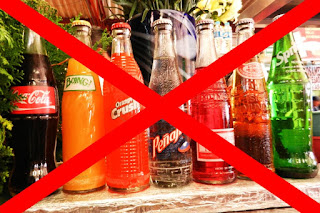Latest Gossip
1. Drink more water. Most of us don’t drink enough water every day. Water is essential for our bodies to function. Do you know over 60% of our body is made up of water? Water is needed to carry out body functions, remove waste, and carry nutrients and oxygen around our body. Since we lose water daily through urine, bowel movements, perspiration, and breathing, we need to replenish our water intake.
Furthermore, drinking water helps in losing weight. statistics shows that overweight or obese people showed that water drinkers lose 4.5 more pounds than a control group! The researchers believe that it’s because drinking more water helps fill your stomach, making you less hungry and less likely to overeat.
The amount of water we need is dependent on various factors such as humidity, your physical activity, and your weight, but generally, we need 2.7-3.7 liters of water intake per day. Since food intake contributes about 20% of our fluid intake, that means we need to drink about 2.0-3.0 liters of water or about 8-10 glasses (now you know how the 8 glasses recommendation came about!). One way to tell if you’re hydrated — your urine should be slightly yellow. If it’s not, like it’s dark yellow or even orange, you’re not getting enough water! Other signs include dry lips, dry mouth, and little urination. Go drink some water first before you continue this article!
2.Get enough sleep. When you don’t rest well, you compensate by eating more. Usually, it’s junk food. Get enough rest and you don’t need to snack to stay awake. Also, lack of sleep causes premature aging and you don’t want that!
3.Meditate. Meditation quietens your mind and calm you down. If you don’t know how to meditate, don’t worry.
4. Exercise. Movement is life. Research has shown that exercising daily brings tremendous benefits of health, including an increase in lifespan, lowering of risk of diseases, higher bone density, and weight loss. Increase the activity in your life. Choose walking over transport for close distances. Climb the stairs instead of taking the lift. Join an aerobics class or a dance class.
5. Work out different parts of your body. Don’t just do cardio (like jogging). Give your body a proper workout. The easiest way is to engage in sports since they work out different muscle groups. Popular activities where you can get a good body workout are trekking, hiking, swimming, basketball, tennis, squash, badminton, yoga, and Frisbee.
6. Eat fruits. Fruits have a load of vitamins and minerals. Do you know that oranges offer more health benefits than vitamin C pills? As much as possible, consume your vitamins and minerals through your diet rather than through pills. I eat a variety of fruits every morning and they energize me. Satisfy your palate with these nutritious fruits: Banana, Papaya, Kiwi, Strawberries, Blueberries, Blackberries, Raspberries, Watermelon, Rockmelon, Honeydew, Peach, Apple, Grapefruit, Pomelo, Mango, Orange.
7. Cut down on processed food. Processed food is not good because (a) most of the nutritional value is lost in the creation of these foods, and (b) the added preservatives are bad for our health. Many processed foods contain a high amount of salt which leads to higher blood pressure and heart disease. In general, the more ingredients a food has on the label (ending with ‘ite’ or ‘ate’), the more processed it is.
8. Love yourself. Self-love is a crucial part of living a healthy life. When you have a negative self-image, it naturally weighs down on your mental outlook and health. How much do you love yourself on a scale of 1-10?
9. Walk/Run barefoot. There are many benefits of barefoot walking/running, from having a better posture to less stress for your feet and joints. If the terrain in your neighborhood is too sharp, wear barefoot shoes. I’ve been running barefoot since May 2010 and loving it
10.Purge negative people from your life. Positive mental health is part of a healthy life. You don’t need toxic people in your life. If you feel that a friend is overly critical or negative, let him/her go
11. Breathe. Deeply. Oxygen is vital for life. You may know how to breathe, but are you breathing properly? Most of us aren’t breathing properly — we take shallow breaths and breathe to 1/3 of our lung capacity. Athletes are taught proper breathing techniques to get their best performance. A full breath is one where your lungs are fully filled, your abdomen expands, and there’s minimum movement in your shoulders.
12 . Improve your posture. Having a good posture improves your breathing and makes you look smarter and more attractive.
13. Eat small meals. Choose several small meals over huge meals as it evens out your energy distribution. It’s also better for your stomach as it doesn’t over-stretch from digesting a huge volume of food at one go. In general, eat when you feel hungry and stop when you’re full.
14. Cut down on sugary food/drinks. Sugary food consists of your candy bars, pastries, chocolate, cookies, cakes, and jelly donuts. Not only do they not fill you, but they trigger you to eat more due to the sugar rush. Eating once in a while is okay, but not daily. Go for healthy snacks instead. Sugary drinks are unfortunately sold everywhere today, namely in the form of soda and sweet drinks. These drinks are unhealthy and cause weight gain. Go for plain water, green tea, or vegetable juices instead!
15. Go organic (where possible). organic food is food produced without synthetic inputs such as pesticides and chemical fertilizers; that does not contain genetically modified organisms; and that is not processed using irradiation, industrial solvents, or chemical food additives. The organic movement is slowly catching on with more stores offering organic options. While organic food tends to cost more, would you rather save some money and feed your body with pesticides or pay a few extra dollars for a cleaner, healthier body? I try to buy organic where possible (depending on budget).
16. Beware of vegetable oils. Over the years, I began to learn more about healthy vs. unhealthy food. I learned that many vegetable oils, which are basically used in many food products and almost all restaurants today, are toxic. This includes all refined oils such as canola oil, rapeseed oil, soybean oil, palm oil, sunflower oil, and even olive oil. Despite the whole “heart healthy” branding surrounding vegetable oils, oil is not a natural food. It’s an extremely processed food stripped of all the nutrients/fiber/protein/etc. of the original food. Many commercial oils are high in omega-6 polyunsaturated fat which is inflammatory.[5] In fact, the current prevalent use of vegetable oils was practically non-existent before the 1900s, and it was from a strong marketing push by Procter and Gamble in the 1910s that vegetable oil began to be used in a widespread manner. Today, corporations use vegetable oils in food because (a) they are cheap and (b) they lengthen the shelf life of food, but they are not healthy in any way and create a lot of toxicity to the body. The best way to cut down on oil (because oil is everywhere) is to prepare your own meals
17. Prepare your meals. Whenever I can, I prepare my meals. When you prepare your meals, you control what goes into them rather than choosing between sub-standard options in a restaurant. Get quality kitchen equipment — it will be your best investment ever. Having a blender makes it a breeze to make your fruit/vegetable juices! Having an instant pot and an oven makes cooking much easier too.
18. Stop smoking. Smoking is detrimental to health, severely increases the risk of lung cancer, kidney cancer, esophageal cancer (of our gullet), heart attack, and more. Smoking “lite” cigarettes do not decrease health risks either. If you’re a smoker, quit not just for yourself, but for your family and friends. If you don’t smoke, stay that way and don’t start
19. Avoid passive smoking. Second-hand smoking (breathing in air from smokers) causes many of the same long-term diseases as direct smoking .Did you know? According to the CDC (Centers for Disease Control and Prevention), there is no risk-free level of passive smoking; even brief exposure can be harmful to health. Get away from smokers and avoid cigarette smoke where you can.
20. Get regular checkups. Some diseases don’t show up as symptoms until it is too late. Get regular blood tests for blood sugar, vitamins, and minerals, along with urine tests. More elaborate tests like mammograms (for women), PAP smear (for women), colonoscopy, etc. should be done at the recommended intervals. If the test results are not optimal, that means that you can quickly take corrective action. If they are great, that’s fantastic and you can have peace of mind!









This comment has been removed by the author.
ReplyDelete